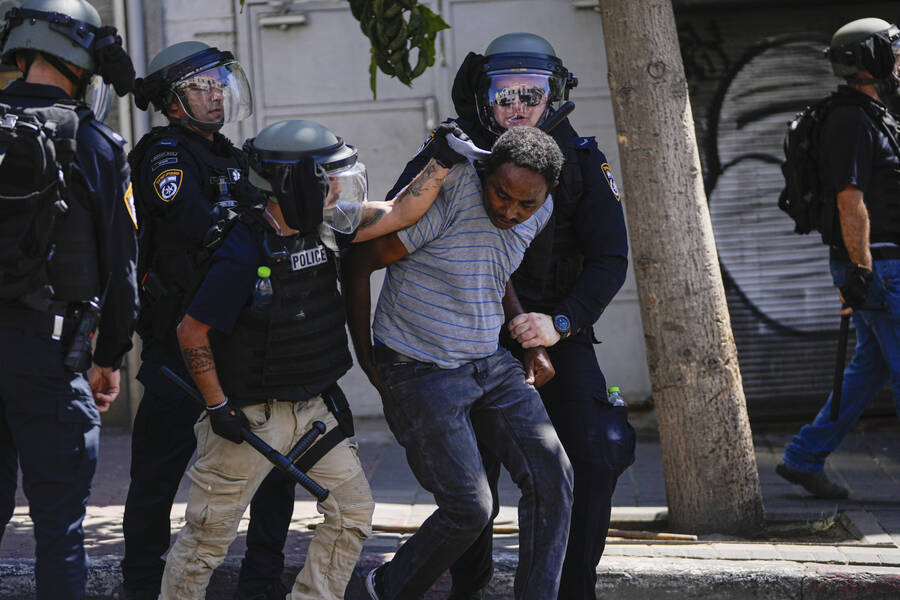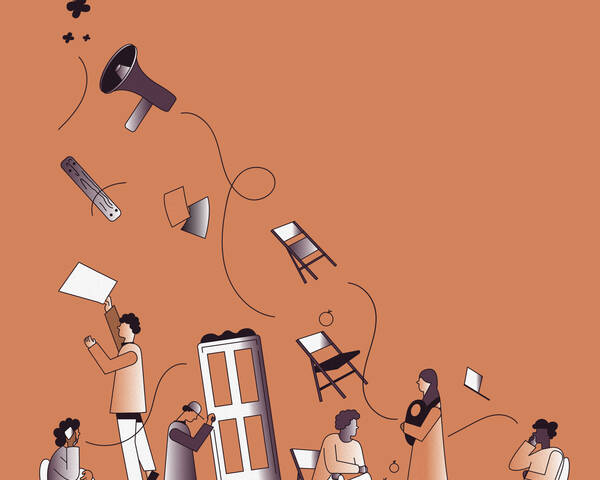
Israeli riot police apprehend an Eritrean protester in Tel Aviv on September 2nd.
(This article previously appeared in the Jewish Currents email newsletter; subscribe here!)
On September 2nd, Israeli police opened fire on a crowd of hundreds of Eritreans in Tel Aviv. The police were responding to street fighting outside a contentious event hosted by the Eritrean embassy: a celebration of 30 years of Eritrean President Isaias Afwerki’s autocratic rule, described by human rights groups as one of the most repressive in the world. Hundreds of pro-government Eritreans gathered at the celebration, but hundreds of others arrived on the scene seeking to disrupt the event, which they saw as pro-autocracy propaganda. Violent clashes ensued between the two sides, as Eritreans with opposing views on Afwerki used construction lumber, stones, and at least one axe to attack each other. But it was the involvement of the Israeli police that escalated a chaotic street fight into a far more dangerous situation, especially after the police used live ammunition on the protestors in addition to tear gas and stun grenades. Over 100 Eritreans were injured, including about 11 people who were shot.
The police violence was only one part of a full-fledged offensive that the Israeli government has launched against the country’s Eritrean immigrants since the September 2nd clashes. In the past week, Israeli authorities have placed over 50 Eritrean protest participants in administrative detention—imprisonment without charge or trial. On Friday, Haaretz reported that the Israeli police had closed four Eritrean churches in Tel Aviv because of fears of further violence. Meanwhile, Israeli Prime Minister Benjamin Netanyahu vowed to deport Eritreans involved in the clashes, and also asked his ministers for a plan to deport all immigrants believed to have entered Israel illegally. One anti-migrant plan was unveiled on Sunday, when the Israeli government announced a $7.8 million anti-asylum seeker program that includes funding to encourage migrants to depart. The program will also strengthen the police presence in south Tel Aviv, where many asylum seekers live. “It seems that officials in the government were just waiting for an opportunity to start a wild campaign against Eritrean refugees and the asylum-seeker community as a whole,” said Tali Ehrenthal, executive director of Aid Organization for Refugees and Asylum Seekers in Israel, also known as ASSAF. “There is a sense that [the government] is trying to pave the way for a fatal violation of [asylum-seekers’] human rights and prepare public opinion for additional legislative initiatives that will hurt the community and put them at risk.”
Israel’s Eritrean community, which numbers around 17,000, is made up predominantly of low-wage workers, many of them asylum seekers who fled the autocracy under Afwerki and now live in precarity. Since 2001, Israel has maintained a policy of giving Eritreans “temporary protection” status to shield them from deportation back to Eritrea’s repressive rule. However, the Israeli right, which is now in power, has long tried to target the community, which it characterizes as one of “illegal infiltrators.” The recent crackdown on Eritrean migrants is an escalation in the right’s years-long anti-migrant campaign which seeks to protect Israel’s Jewish majority. In 2012, former Interior Minister Eli Yishai told the Israeli outlet Ynet that undocumented migrants posed a threat to the “Zionist dream,” adding that “until I can deport them, I’ll lock them up to make their lives miserable.” In recent years, Israeli authorities have built detention centers for asylum-seekers and attempted to jail them for years or even indefinitely without trial, though laws permitting such detention were ultimately struck down by the Supreme Court. (Currently, Israeli authorities can detain someone who entered without authorization for up to three months.)
The government has also used economic tools to get migrants to leave. In 2013, Israeli authorities began inducing asylum-seekers to leave “voluntarily”—often under the threat of detention—by giving them plane tickets, travel documents, and $3,500 in cash. In 2017, Israel’s Knesset passed a law requiring asylum-seekers to deposit 20% of their monthly salary into a bank account which would only become accessible when they leave Israel (another law the Supreme Court eventually struck down). And in 2022, the Ministry of Interior decided to ban asylum seekers from working in 17 Israeli cities unless they are senior citizens, parents, or employed in a small number of industries that rely on immigrant labor. Moreover, while justifying its actions against the community by calling Eritrean immigrants “illegal infiltrators,” Israel consistently denies Eritreans legal status, rejecting the overwhelming majority of their asylum requests. No more than 30 Eritreans have ever been recognized as refugees in Israel, a number far lower than that for Eritrean asylum-seekers in most other countries. “Israeli policy makes it very hard for the asylum seekers here, and [anti-Afwerki] Eritreans have no option,” said Halefom Sultan, an Eritrean asylum-seeker and activist living in Israel. “The only option is to live with the situation [of legal precarity], even if it means going to prison.”
Many of Israel’s anti-migrant policies were implemented to discourage immigration after the large influx of African asylum-seekers into the country since 2005. “It doesn’t matter what kind of government coalition there is; the ministers in charge always prefer Jewish demography over the Jewish values of accepting these people and protecting them,” Sigal Rosen, public policy coordinator for the Hotline for Refugees and Migrants, told Jewish Currents. The window for entering Israel largely closed in 2013, when Israel constructed a fence on its border with Egypt and sharply reduced the number of migrants arriving. “The wall was built due to the demographic fear expressed by several decision makers that millions of ‘infiltrators’ will come if there is no wall,” said Rosen.
Israel’s right-wing government is now exploiting the aftermath of the Eritrean clashes to further its campaign against the non-Jewish migrants who did make it in. In addition to the immediate measures targeting the Eritrean community and other asylum seekers, rightwing lawmakers are using the Eritrean protests to push for an expansive anti-immigration policy, which was first proposed in May 2021 by Knesset member Simcha Rothman—one of the architects of the government’s push to weaken the Israeli judiciary. Rothman’s bill seeks to deport all immigrants who entered Israel without authorization while preventing them from appealing to Israeli courts for relief. Since Jewish immigrants to Israel can always obtain citizenship, such a move would only target the country’s non-Jewish immigrants. “No democratic country in the world has adopted such a cruel and illegal concept,” said Ehrenthal. “The core ambition is to make the executive branch—the Population and Immigration Authority—all-powerful, and to allow it to trample, without any restraint, the rights of anyone who does not hold Israeli citizenship.”
Amjad Iraqi, a senior editor at +972 Magazine, said Israel’s treatment of Eritreans is continuous with how Israel’s system of apartheid discriminates against non-Jews. “While apartheid is primarily targeting Palestinians, non-Jews in general are excluded from the Israeli Jewish political community,” he said, noting that discriminating against African migrants “fits naturally into Israel’s apartheid logic.” Even Israeli officials have gestured to the parallel between the Eritrean community and Palestinians, with one law enforcement official telling Haaretz that the unrest at the Eritrean embassy in Tel Aviv was “the kind of [scene] you only see in the West Bank.” Tamara Newman, the director of international relations for the Association for Civil Rights in Israel, told Jewish Currents that the comparison is revealing because Israeli police “responded like they do in the West Bank [by] using live fire on a population that has little to no rights and is an oppressed population.” Indeed, this was the first time live fire has been used on protesters inside the Green Line since October 2000, when police gunned down 12 Palestinian citizens of Israel (and one Palestinian from Gaza) for demonstrating against Israel’s violent response to the beginning of the Second Intifada.
Newman told Jewish Currents that Israeli police “would never use live fire on Israeli Jews protesting in Tel Aviv.” Israeli police explained their use of live fire by claiming that their lives were at risk, and an estimated 50 officers were indeed injured, sustaining bruises from stones and other blunt objects. But Newman said that while some of the demonstrators had been violent—one Eritrean was even arrested for carrying a pistol—police lives were not at risk, and that the police response “was completely disproportionate.” Iraqi agreed, adding that the use of disproportionate force on non-Jews was common in Israel. “The psychology of Israeli police officers is rooted in a hierarchy that determines who can be targeted. If it’s a Palestinian, or a brown or Black person, that means they can exercise much more brutal force,” he said. “When you have that psychological worldview, it enables the cops to do what they did to the Eritreans. This is the racism that is inherent to how they police.”

